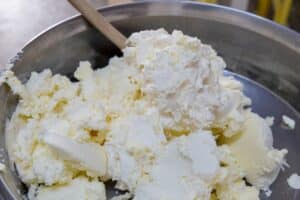Whether you’ve simply run out of almond milk while in the middle of a baking marathon or you are looking to try out more environmentally-friendly alternative milk options, there is plenty of almond milk substitutes out there to try. Non-dairy milk like cashew, coconut, and rice milk are all excellent alternatives that provide similar nutrition, flavor, and texture.
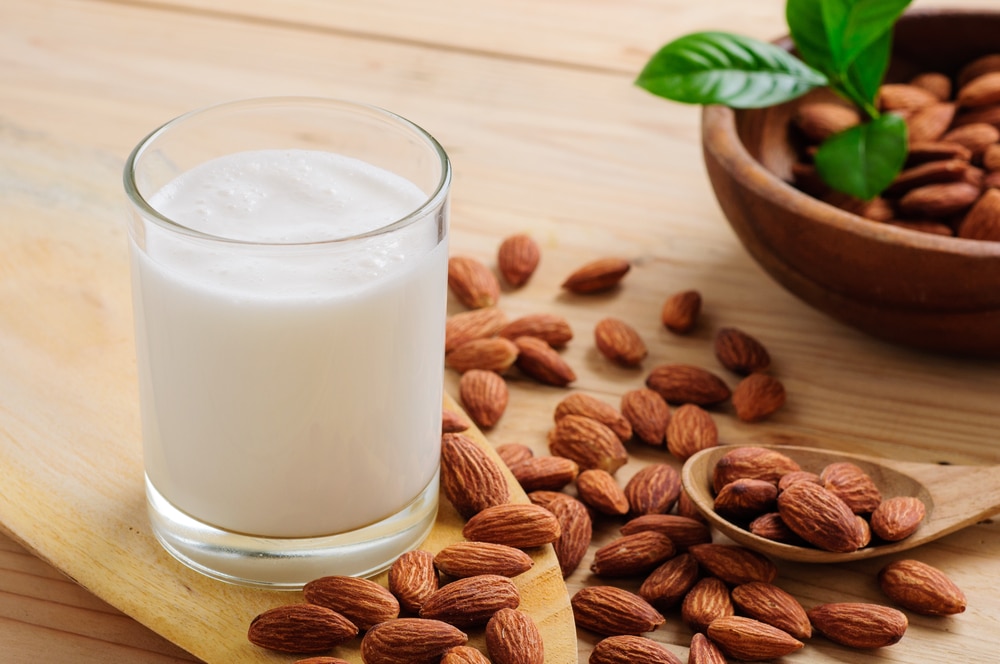
Top 5 Almond Milk Substitutes
There are dozens of alternatives to almond milk available to try, but we believe that the following 5 are the absolute best.
Cashew Milk
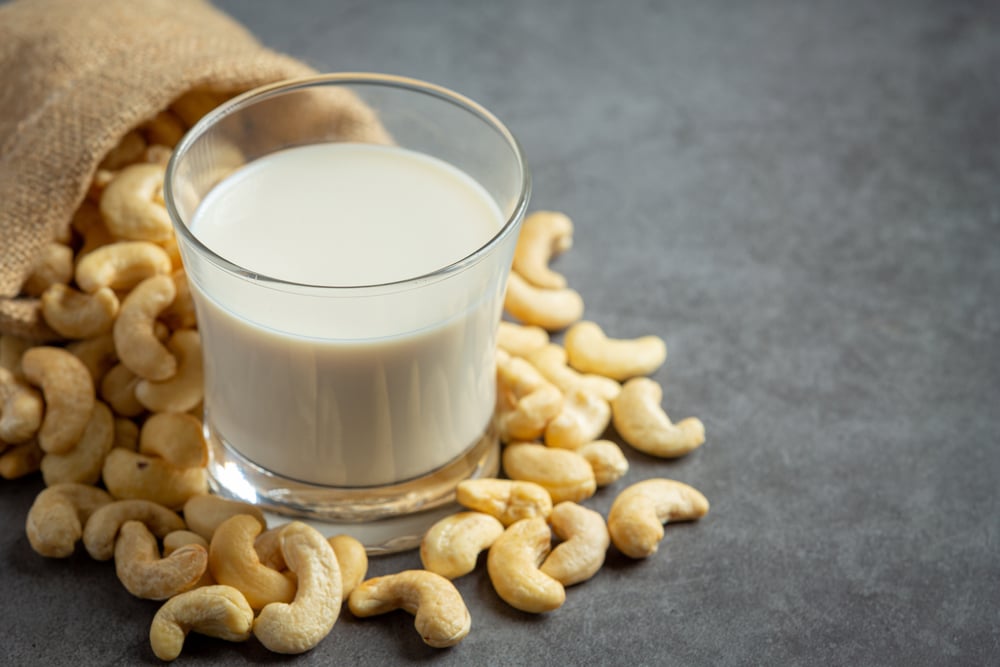
Cashew milk is one of the best almond milk substitutes. It is much closer to regular cow’s milk in terms of consistency and overall flavor. It also has a richer, creamier texture than other types of non-dairy milk, which may make it easier to transition to for traditional dairy drinkers.
Cashew milk has a slightly earthier flavor than almond milk, while almond milk has a nuttier profile. On its own, cashew milk is great for use as a coffee creamer, cooking soups or sauces, and even enjoying a solitary glass by itself.
This nut milk is made by soaking roasted and shelled cashews in filtered water until they are soft enough to be ground into a paste. The solids are filtered out, and the liquid left behind is what is classified as “milk.”
From a nutrition standpoint, cashew and almond milk are extremely similar. Both are low in calories and low in fat. A single cup contains 1g of carbohydrates. They also contain less than 1g of protein per cup and are fortified with necessary vitamins like A, D, E, and Calcium.
In most recipes, cashew milk can be substituted for almond milk in a 1:1 ratio.
Coconut Milk
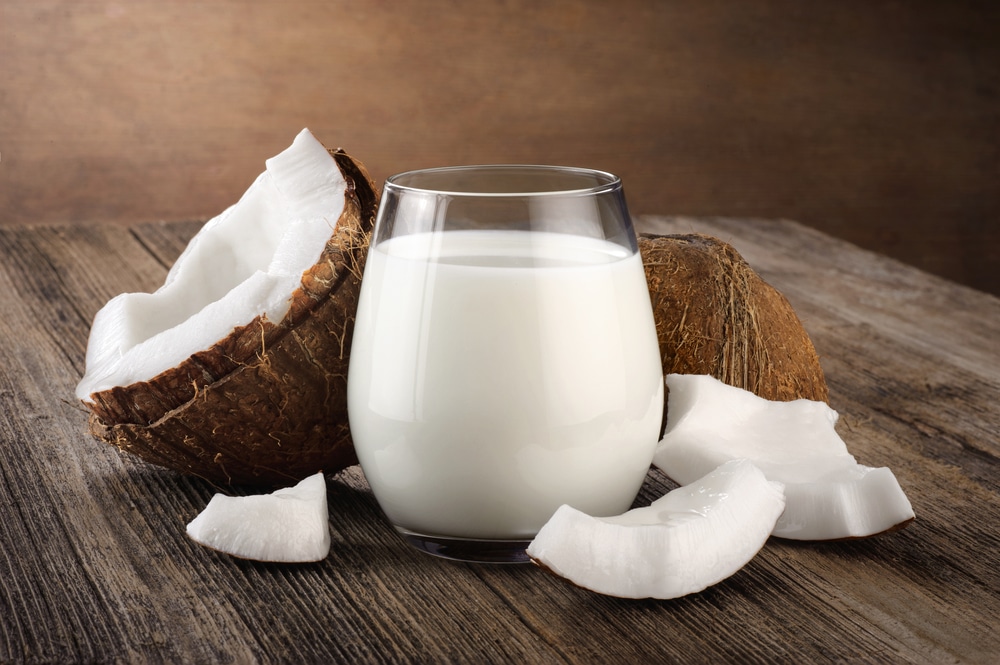
Another excellent alternative to almond milk is coconut milk. Coconut milk is a creamy, higher-fat alternative that provides many of the same benefits as regular milk. It is made from the flesh of the coconut and is much thicker than almond milk. It has a naturally sweet flavor that can elevate everything from your morning coffee to your dinnertime sauce.
Unlike almond milk, coconut milk can also be used as a whipped cream alternative. The result is a light, airy cream that has the slightest hint of coconut flavor.
Coconut milk has a higher calorie content than almond milk, with 1 cup totaling around 70 calories with 6g of sugar. Despite this, in most recipes, you can substitute coconut milk in a 1:1 ratio. Keep in mind that coconut milk’s creamier texture may alter the final product.
Soy Milk
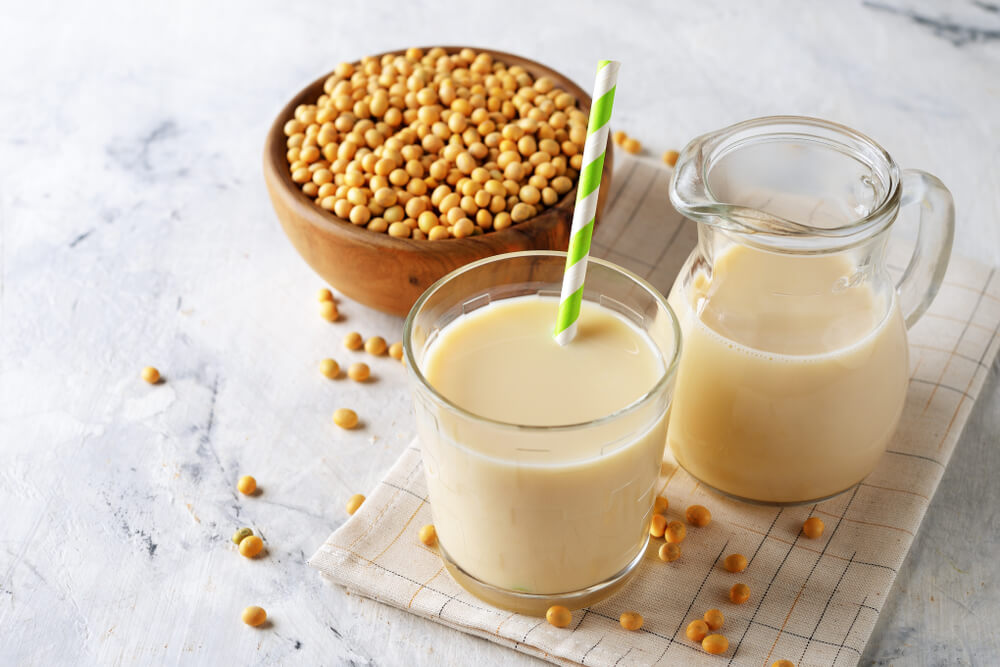
Soy milk is a popular plant-based milk alternative that makes a great substitute for almond milk, especially if you’re trying to avoid nuts. It is made from soybeans and is typically fortified with vitamins and omega-3 fatty acids to make it a healthy, non-dairy alternative.
Where almond milk is a neutral flavor with just a hint of nuttiness, soy milk is thicker and creamier. It has a mild flavor, but many describe it as chalky when enjoyed on its own. As a substitution in recipes, however, the less pleasant flavors are largely eradicated.
Nutrition-wise, 1 cup of soy milk equals 80 calories, 4g of fat, 3g of carbs, and 2g of fiber. It also contains 7g of protein, which is significantly higher than the protein content of almond milk.
If you would like to replace almond milk for soy milk in a recipe, simply swap it out in a 1:1 ratio. Soy milk is best for making sweets and desserts such as cake, pie, or other structure-heavy foods.
Oat Milk
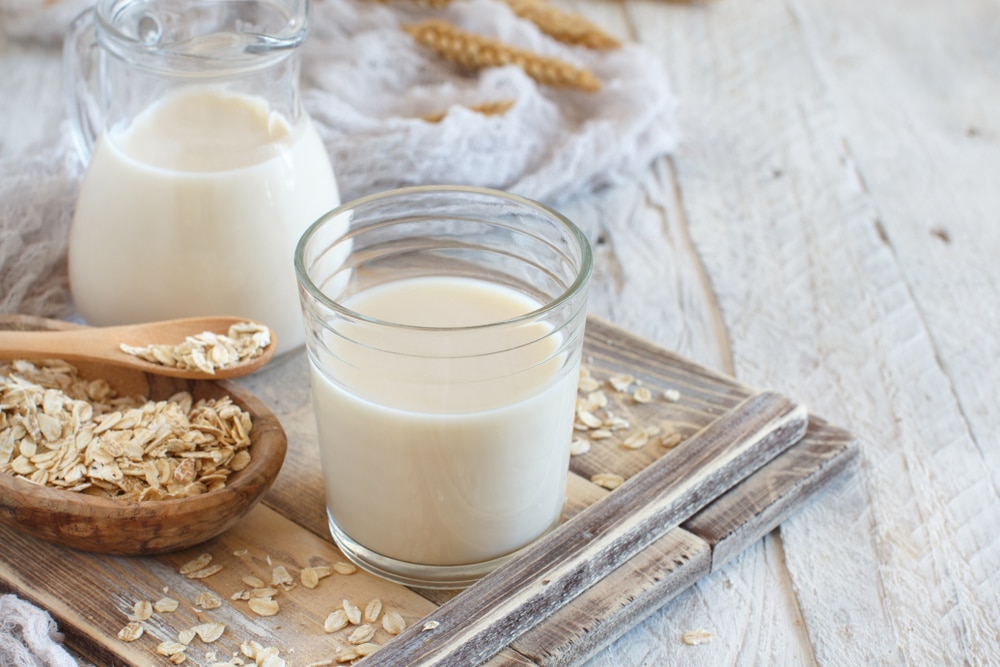
Oat milk is made from steel-cut oats that are soaked in water before being blended and strained. The remaining liquid is smooth and has a warm, toasty oat flavor that many prefer over the nutty taste of almond milk.
Oat milk is also a great alternative to almond milk thanks to how much creamier it is. It can easily replace almond milk in any recipe, including for desserts and savory soups. Baristas often use oat milk for non-dairy lattes and espresso beverages thanks to how easily it foams up in comparison with nut-milk alternatives.
A single serving of oat milk is going to be higher-calorie than almond milk at 120 calories per serving. It also has 5g of fat, 3g of protein, 16g of carbohydrates, and 7g of sugar. Of all of the alternative milk we’ve discussed thus far, it has the highest number of carbs, taking it out of the running for paleo and keto diet followers.
However, oat milk is high in calcium and vitamin D and has much less sugar than regular cow’s milk.
Hemp Milk
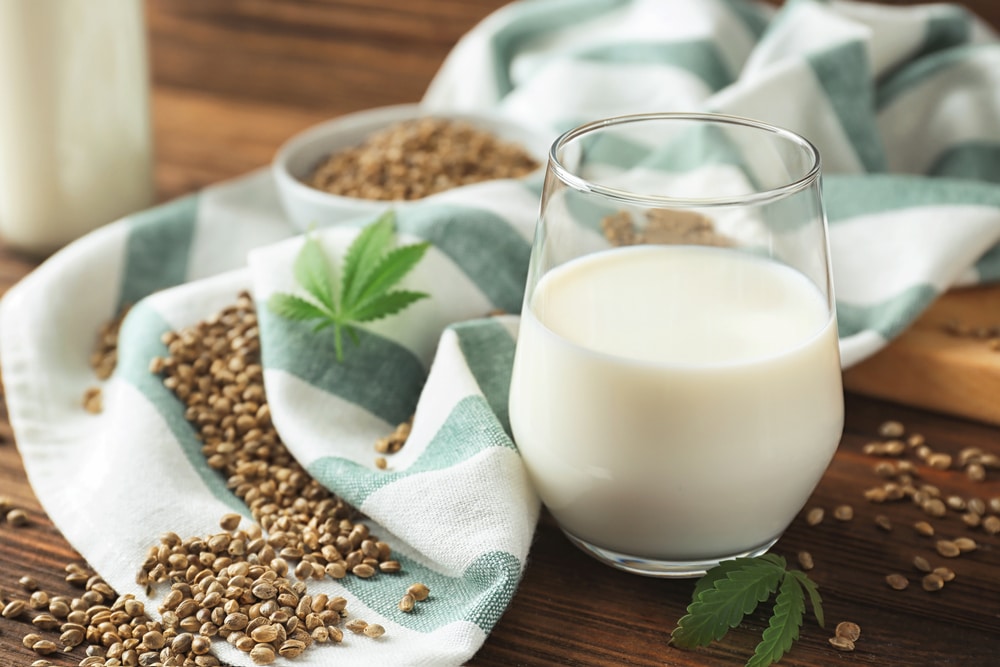
Another popular dairy-alternative milk is hemp milk. Hemp milk is made similarly to most alternative milk in that hemp seeds are blended with water and the solids are filtered out. Hemp milk has a strong earthy flavor with a milk-like consistency.
Although hemp milk comes from the seeds of the Cannabis sativa plant, also known as marijuana the seeds contain extremely low concentrations of cannabinoids. That means that the milk cannot get you high.
Hemp milk is a great almond milk alternative for people who are allergic to nuts and don’t like the taste of soy or oat milk.
It is a high-calorie alternative at 130 calories per cup. A single serving of hemp milk also contains 4g of protein, 3g of fat, 15g of sugar, and 20g of carbohydrates. The higher carb and sugar content make it great for maintaining energy levels. This is also a sweeter option than many milk alternatives.
Most hemp milk is fortified with necessary vitamins and nutrients such as A, D, B12, Iron, Zinc, and Calcium. Many commercially made hemp milk have added thickeners to give it a richer, creamier texture.
Like all of the best almond milk substitutions on this list, you can swap it out for oat milk in any recipe at a 1:1 ratio.
It is important to note that any time you substitute another type of milk or alternative ingredient into a recipe that calls for almond milk, you want to stick with something as close as possible to almond milk to achieve the right texture and consistency of the final product.
Substitute for Almond Milk in Baking
When it comes to almond milk substitutes in baking, it is best to stick with nut milk like cashew or coconut.
Cashew milk in baking has long been common for people who follow a vegan lifestyle. Although it isn’t super popular for drinking alone, it has an incredible texture and a creaminess that elevate recipes traditionally calling for almond milk. Coconut is also great in terms of overall texture, however, it will lend a slight coconut flavor to whatever you’re baking.
If you’re looking for a nut-free alternative to almond milk due to allergies or other dietary restrictions, the best option is soy milk. This milk alternative is of roughly the same texture and consistency as regular almond milk with its watery base.
Soy milk in particular is a great alternative thanks to its high protein content and relatively mild flavor. It stays stable at high temperatures which will allow it to keep the structure of muffins, cakes, or cookies without overpowering the base flavors in your dessert.
Substitute for Almond Milk in a Recipe
When cooking, it is best to substitute almond milk in a recipe for thicker, creamier alternatives such as coconut milk or cashew milk. These non-dairy alternatives are going to be able to enhance the recipe with their higher fat content and pleasant texture.
Frequently Asked Questions
Let’s take a look at some frequently asked questions regarding almond milk substitutes.
Can I replace almond milk with water?
Although water is not the best substitute for almond milk, it will work if you’re left with no other option. Water will provide the necessary liquid your recipe calls for, but it will likely alter the final product by making it less creamy or rich.
Tip: If you replace almond milk with water, add in a tablespoon of butter per cup of water to compensate for the loss of fat.
Can you substitute coconut water for almond milk?
In a similar vein, many people wonder if it is possible to substitute coconut water for almond milk.
Coconut water can be used as an almond milk alternative, however, you run the same risk using coconut water as you do regular water. Coconut water is different than coconut milk in that it is the existing liquid inside a coconut rather than a mixture made from the white flesh of the fruit.
Final Thoughts
The best almond milk alternatives include cashew milk, coconut, soy, oat, and rice milk. Although it may feel overwhelming to choose, no rule that says you can’t try them all. Simply think about what you want to cook or bake and how the underlying factors of protein, fat content, and sugar will affect the final result.




